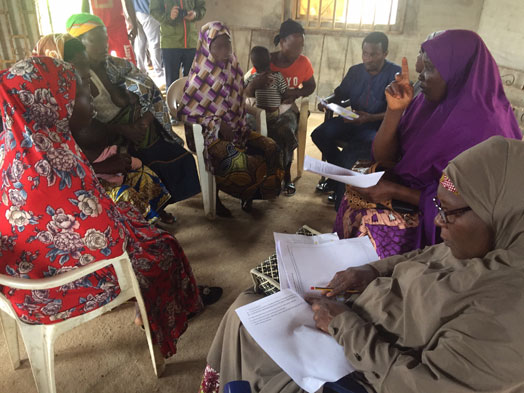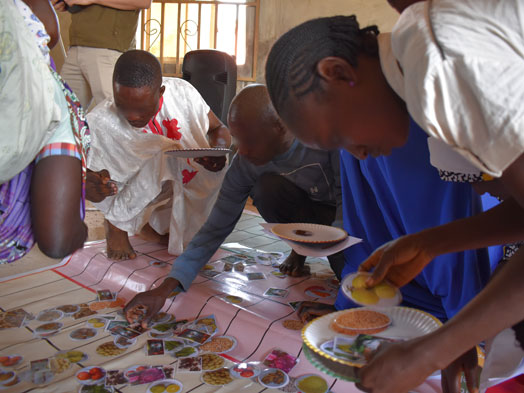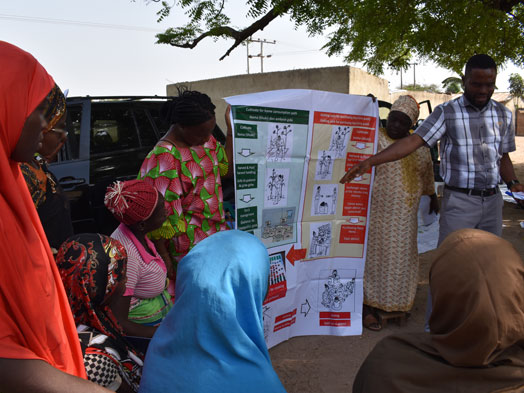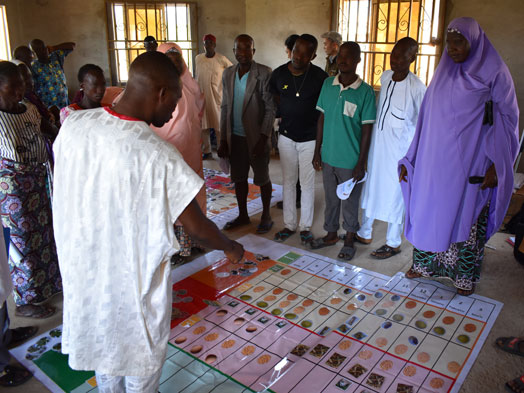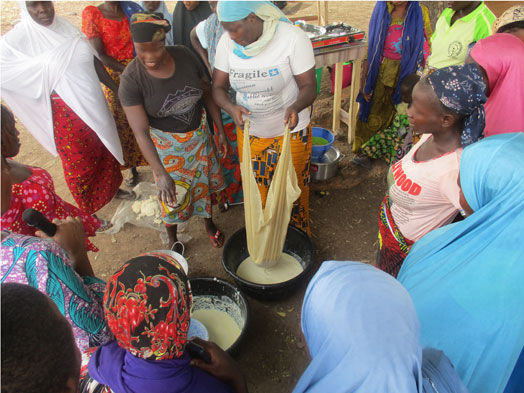Federal Republic of Nigeria
Project on Capacity Development for Nutrition Improvement in Federal Capital Territory
|
■Sector |
: Nutrition Improvement |
|
■Type of technical service |
: Technical Cooperation |
|
■Duration |
: February 2019 - February 2024 |
Background
|
|
|
Focus Group Discussion targeting at mothers with children aged under two |
People in Nigeria face severe nutritional challenges. 32.9 percent of children aged under five are in conditions of stunting due to chronic malnutrition (the 98th in 132 countries); and wasting, an indicator of acute malnutrition, accounts for 7.9 percent (the 93rd in 130 countries) of the children (World Nutrition Report 2016). Nigeria organized a Food and Nutrition Committee comprising multi-sectoral ministries at both national and state levels to put the National Food and Nutrition Policy into practice, however, the Committee faces difficulties to realise comprehensive and practical activities for nutrition improvement at a community-level. The Federal Government of Nigeria requested the Japanese Government to implement a technical cooperation project in Federal Capital Territory aiming at capacity development of government staff at a community level. The request was followed up by conducting a detailed project planning survey by the Japan International Cooperation Agency (JICA) in September 2017. The survey team discussed with related officials of Federal Capital Territory Administration (FCTA) and jointly determined the framework of the Project.
Basic Principles
Develop a food-based nutrition improvement approach with three major areas of interventions, namely: “nutrition, health and hygiene”, “agriculture”, and “livelihood improvement”
|
|
|
Members of the target groups classifying food material cards into the three food groups during the nutrition training |
The causes of nutritional problem are complex and intertwined with each other. These causes include lack of nutrition knowledge and hygiene awareness, imbalanced crop selection, inadequate dietary intake and access to nutritious food, short-sighted planning on cash management and food storage, etc. To effectively address this, the Project develops a food-based approach to the issue with three major areas of interventions– namely, “nutrition, health and hygiene”, “agriculture” and “livelihood improvement”. The Project focuses on households with expecting mothers, children aged under two, and their mothers and works on improving their dietary quality and quantity and diversifying their food varieties. The Project also works for all people in the pilot sites to improve their nutritional issues.
Introduce a multi-sectoral implementation structure
Although collaboration among the stakeholders is a key to cope with the challenges described above, it has been difficult because different ministries are in charge of respective three major areas of intervention. Therefore, the Project introduces a multi-sectoral implementation structure in order to establish the coordination mechanism among them.
Main Activities
Following the principles above, a series of activities implemented are explained below.
Selection of Pilot Sites
The Project developed selection criteria such as the extent of existing nutritional problems and motivation of the residents for nutrition improvement activities, and made field visits to candidate villages with the counterparts for evaluation. The results were discussed in the first Joint Coordinating Committee (JCC) and three pilot sites were singled out.
Implementation of Baseline Survey
The Project implemented a baseline survey in the pilot sites selected above. The survey targeted households with expecting mothers, children aged under two, and their mothers, interviewing their diet, hygiene, agriculture, livelihood improvement, etc. and conducting body measurements. The results were shared in the second JCC with the stakeholders to exchange opinions.
Establishment of a Multi-Sectoral Team
The Project formulated a framework of multi-sectoral team to facilitate collaboration among different ministries in-charge and appointed the members for each pilot site.
Selection of Target Groups
The Project selected twenty eager-to-learn couples, and thus forty members in total, as a target group in each pilot site, taking into account a variety of factors including balances of ethnicities and religions based on the recommendations from community leaders.
Implementation of training and on-the-job-training (OJT)
Two types of trainings, one for target group members and the other for all residents in pilot sites, will be conducted. The Project will develop training programmes with substantial contents on not only nutrition, but also other sectors such as hygiene, agriculture, and livelihood improvement, while its effective implementation schedule and order are considered. The Project will also pay attention to making training contents easily understandable to any participants including illiterate people, for example, by developing training materials with abundant illustrations.
The training implementation will have two stages. Firstly, the Project consultants will implement a preliminary training to the counterparts to further develop the contents through feedbacks, and secondly, the counterparts themselves will turn to be facilitators in the training for the residents concerned. Through such process, the Project will develop quality and effective training which matches the local contexts.
(As of February 2020)
|
|
|
|
|
Training in agriculture for target groups |
Training in nutrition for target groups |
Training in livelihood improvement (food processing) for target groups |
A Message from the Consultant in-charge
|
|
|
Hideki SONOYAMA Manager / Consultant Consulting Department |
The Project primarily aims to improve nutritional conditions of children and women in Nigeria through “dietary improvement”, however, just offering to them learning opportunities about food and nutrition is not enough to realize the sufficient impact.
In many cases, there are hidden, complicated and multi-dimensional issues behind the screen of nutritional problems of the local people, for example; hard to cultivate good amount and variety of agricultural products for nutritious meals in their fields; inappropriate management of their income and household cash makes them difficult to buy food materials in the market; diarrhoea and other diseases caused by unsanitary living environment prevent them from eating well; husbands and other family members are not fully aware of importance of consideration on diets during pregnancy and child infancy. These are the reasons why multi-sectoral support is in need to comprehensively address such situation.
We are tackling this tough challenge together with the highly motivated multi-sectoral team members such as extension staff and local government staff from agriculture and health sectors. They work eagerly in these activities and exchange opinions to help each other. We will share our ideas continuously and patiently to improve our activities, and support them solving these challenges.
